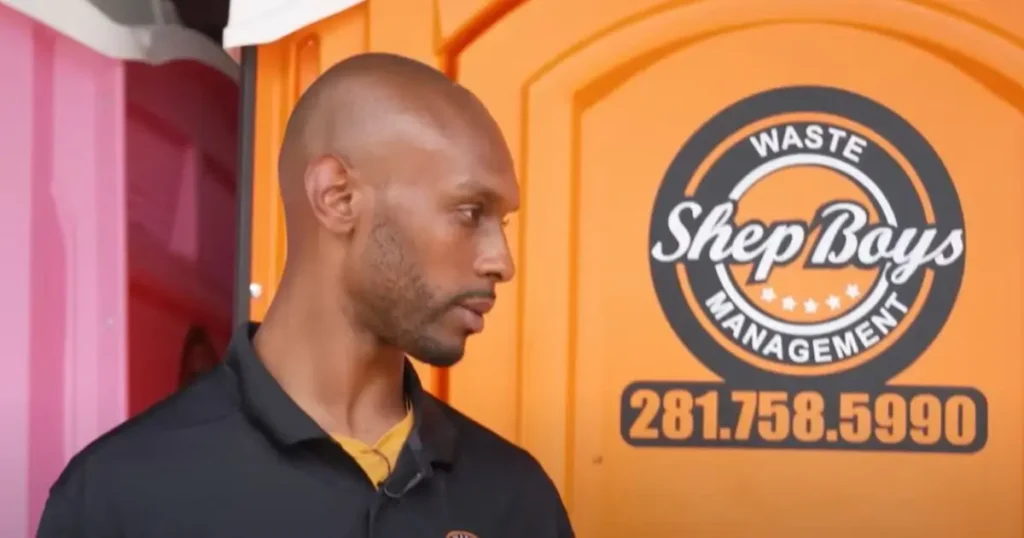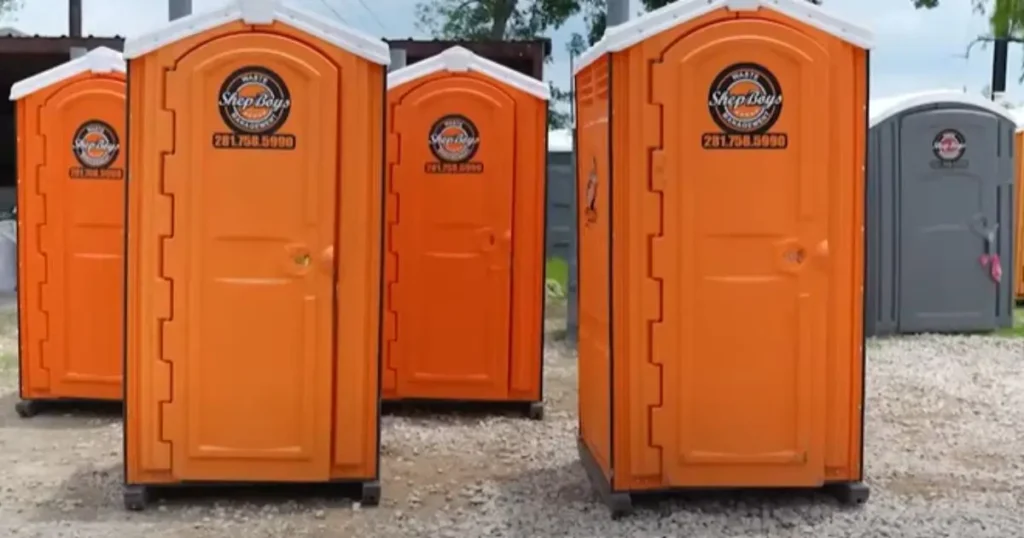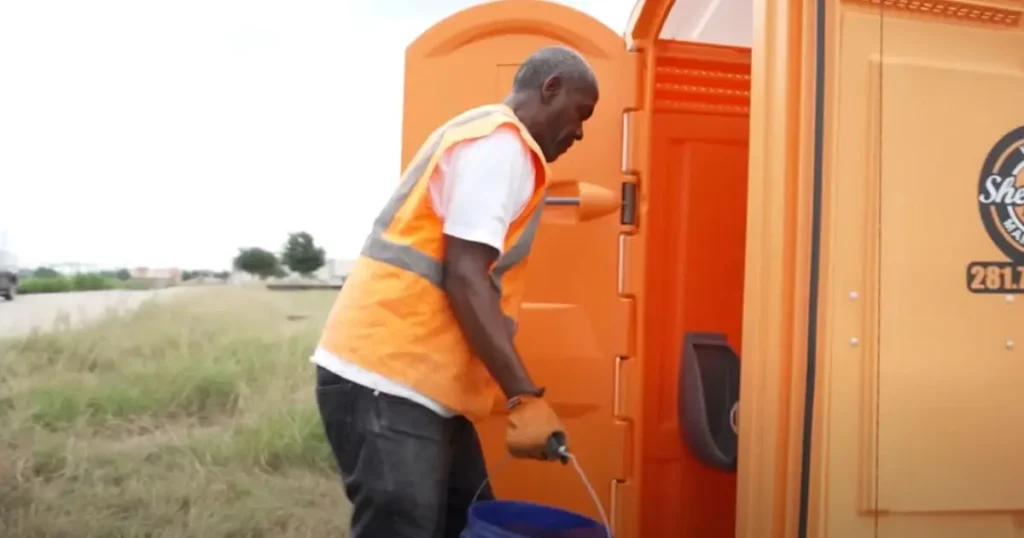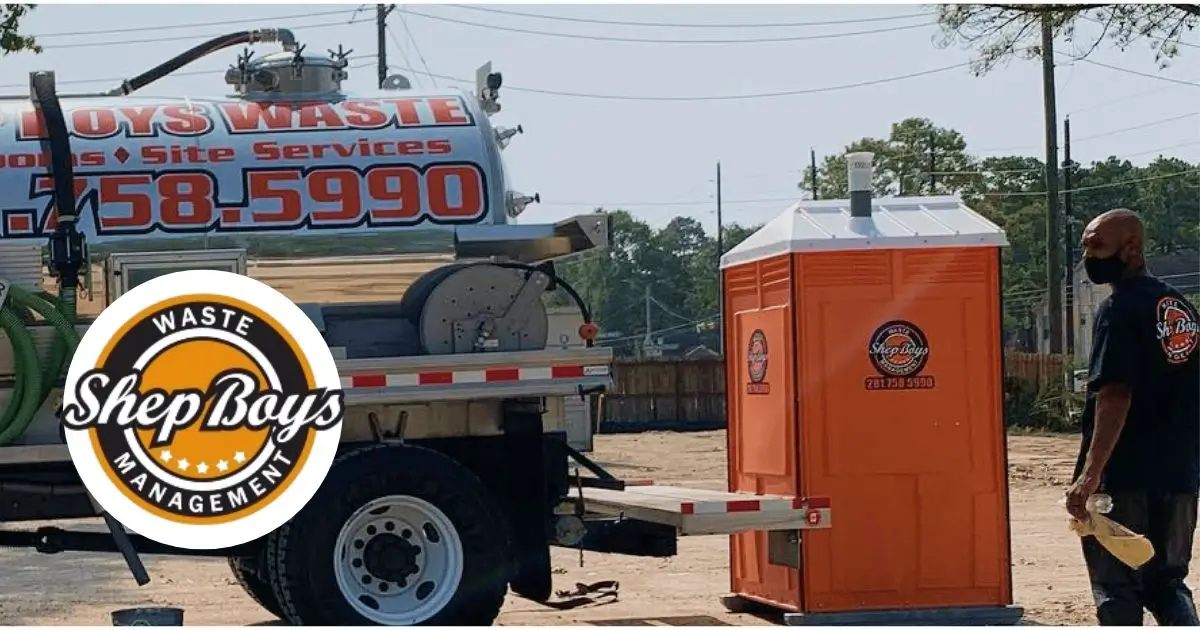The journey from NFL player to entrepreneur isn’t common, but for Russell Sheer, it was a transformative leap. After a successful, albeit short, NFL career, Russell dove into an unexpected industry: portable toilets—otherwise known as “porta potties.” What started as a humble endeavor soon grew into a thriving business generating $20,000 monthly within the first few months.
This article breaks down Russell’s success story, detailing his strategies and sharing insights for those considering a similar path in the lucrative and surprisingly “golden” porta potties business.
Table of Contents
Background on the Porta Potties Industry
The portable sanitation industry, often overlooked but indispensable, has quietly grown into a multi-billion-dollar market. According to recent industry reports, the global portable toilet market size was valued at approximately $20 billion in 2023 and is projected to grow at a steady rate due to increasing urbanization, event-based activities, and stricter hygiene regulations worldwide. Events, construction sites, and disaster relief operations rely heavily on portable toilets, with demand surging as cities expand and as regulations mandate sanitation accessibility in public and remote areas.
The stability of this industry lies in its recession-proof nature. Whether in economic upturns or downturns, sanitation remains a critical need. Portable toilet services are particularly valuable for large outdoor events, disaster zones, and long-term construction projects where plumbing isn’t an option. As a result, rental companies typically enjoy recurring revenue, with each portable unit rented out multiple times throughout the year.
Russell Sheer’s decision to enter this industry reflects his keen eye for steady, essential services that can withstand economic fluctuations. The industry’s continued growth makes it an attractive, if unconventional, path for entrepreneurs looking for low-cost entry and high-return potential.
Discover more by reading our article on launching a business in upscale portable bathrooms.
The Unlikely Leap into Porta Potties
Russell’s interest in the waste management industry was sparked one morning while observing Manhattan’s clean streets after a night of festivities. He realized that the waste management sector—often overlooked and underappreciated—held immense potential. Coming from a family involved in the dump truck business, Russell was no stranger to waste logistics. But the porta potties market offered unique appeal: it was steady, necessary, and in his words, “recession-proof.”

Overcoming Doubts
Entrepreneurs face their share of challenges. Russell remembers early setbacks, from financial hurdles to doubters. Starting without immediate bank support, he used his savings to keep the business afloat. Over time, he’s learned to ignore the noise, trusting his instincts and focusing on building something valuable.
It hasn’t been easy. As a former athlete, he had to battle self-doubt, especially during the first year. Giving up a professional sports career to drive a waste truck was humbling, but he stayed focused on his goal of building a successful business.
From Humble Beginnings to High Profits
After securing initial investments, Russell launched his porta-potties rental company “Shep Boys“ with a modest number of units. Initially, they served local construction projects, special events, and even disaster relief zones. Within just three months, his revenue climbed rapidly:
First Month: Approximately $6,000 in revenue.
Second Month: Around $12,000 in revenue.
Third Month: Skyrocketed to over $18,000.
Scaling Up: Russell’s porta potties business evolved quickly. Starting with a few basic units, he expanded his inventory to include deluxe, flushable porta potties, and even water tanks for temporary housing projects. Today, his business manages over 1,500 porta-potty units, generating substantial monthly income and putting him on track to reach multi-million-dollar annual revenue.
How Russell Turned Porta Potties into a Lucrative Business
The “Dirty” High-Demand Business Model
Porta potties are in high demand across various sectors, from construction and disaster response to large gatherings. Events, festivals, and construction sites all require sanitary services, often regularly. By renting out each porta-potty unit, Russell achieved high returns on his initial investment in these units.
Initial Investment: Each porta potty unit costs about $500 to produce.
Rental Revenue: Each unit generates $125 per 28-day rental cycle, recovering the initial cost within 2-4 months.
In addition to porta potties, Russell added a range of water tanks and sanitation services, each diversifying his revenue streams while meeting demand in an ever-expanding market.

Porta Potties Business Strategies: Key Factors in Russell’s Success
Local Marketing and Community Ties A significant part of Russell’s marketing strategy involves networking with associations for multifamily developments, hospitals, and more. He invested in a strong online presence with SEO tactics, focusing on local keywords like “Houston porta potties rental,” to ensure his services topped local searches.
Leveraging Reviews and Referrals Russell understood the power of positive customer feedback. By ensuring each client’s experience was exceptional, his business quickly became one of Houston’s most highly reviewed portable restroom providers. Russell emphasizes that “referrals and reviews are invaluable; they translate directly into revenue”.
Smart Use of Social Media While traditional porta-potty businesses often ignore social media, Russell recognized its potential. He used platforms like TikTok to share short, humorous content related to the business and actively engaged with construction and community Facebook pages to connect with potential clients.
Maximizing Profits: High-Margin Services and Low Overhead
An additional edge for Russell’s business was minimizing costs. By locating the business near a water well, he eliminated water bills for his rented water tanks, allowing him to charge clients a premium rate while maintaining low expenses. His pricing model included:
Water Tank Rentals: $225 per month plus $1 per gallon of water, with no water utility cost on his end.
Labor Efficiency: While other businesses require 30+ employees per million dollars in revenue, Russell’s streamlined operations allow him to manage with only 7-10 employees per million.
This approach kept overhead low and margins high, significantly boosting profitability.
Porta Potties: A Recession-Proof Business with Big Rewards
Russell Sheer’s porta potty empire is a testament to the profitability of this unique industry. He turned a simple sanitation service into a multi-million-dollar enterprise by carefully analyzing market demand, optimizing operations, and leveraging community networks. For aspiring entrepreneurs, the porta potties business offers an appealing blend of stability, scalability, and profit potential. With demand for portable sanitation showing no signs of slowing down, those ready to get their hands “dirty” may find their path to liquid gold.
Advice for Aspiring Entrepreneurs
For those inspired to follow in his footsteps, Russell offers practical steps:
- Do Your Research: With so much information available online, researching your industry and market is easier than ever.
- Find a Simple, Fixable Problem: The best businesses solve real problems, especially those people often overlook.
- Gain Hands-On Experience: Even with resources and capital, Russell chose to work as an employee in his own company, learning firsthand how to manage every aspect.
- Build Financial Knowledge: Understanding cash flow, margins, and banking criteria is crucial for growth.
- Leverage Minority Certifications: Programs for minority-owned businesses are expanding to include a wider range of entrepreneurs.
- Plan Your Exit: A business should be built with an endgame in mind, allowing you to leverage your success into new ventures.
Pros and Cons of Waste Management
Waste management has its upsides. With recurring revenue from commercial contracts, it’s an industry that’s unlikely to be impacted by economic downturns. People always need these services, making it recession-resistant and scalable with a hyper-localized approach.

However, it’s not without challenges. The job can be grueling, and as Russell puts it, “It stinks.” His business deals with all kinds of waste, from maggots to grease traps, each requiring careful handling. For Russell, this “gross factor” has become part of the routine, but he says it’s worth it because the smell – as unpleasant as it may be – represents money.
Conclusion
In conclusion, Russell Sheer’s journey from an NFL player to a successful entrepreneur in the portable toilet industry exemplifies the power of seizing unexpected opportunities. By recognizing the significant demand for sanitation solutions and leveraging his unique background, Russell transformed a niche market into a thriving business. His innovative approach, coupled with a keen understanding of customer needs and effective marketing strategies, has positioned his Porta Potties company for long-term success.
The portable restroom industry, often overlooked, is a testament to how essential services can yield substantial profits. With consistent demand across various sectors—such as construction, events, and emergency responses—this business remains resilient, even during economic downturns.
For aspiring entrepreneurs, Russell’s story serves as an inspiration, highlighting that success can arise from unconventional paths. By focusing on solving real problems, investing in community relationships, and maintaining operational efficiency, anyone can tap into the lucrative world of portable sanitation. As the demand for clean, reliable sanitation continues to grow, the opportunities within this sector are ripe for those ready to take the plunge.

